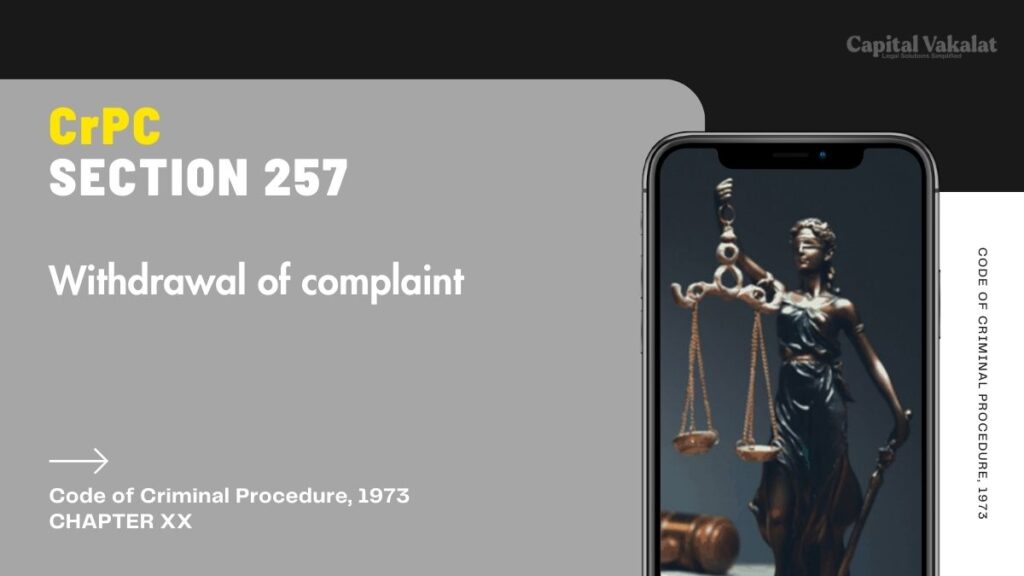Section 257 CrPC: Withdrawal of Complaint addresses a crucial aspect of criminal procedure in India. This section provides the complainant with the ability to withdraw a complaint under specific circumstances, impacting the legal landscape significantly.

In the complex world of criminal law, Section 257 CrPC: Withdrawal of Complaint plays a pivotal role by offering a procedural mechanism for complainants to retract their complaints. This not only affects the parties involved but also the overall judicial process. Understanding the nuances of this section is essential for anyone navigating the legal system, whether they are legal professionals, complainants, or defendants.
Bare Act. Section 257 Cr.P.C.
Withdrawal of complaint.
If a complainant, at any time before a final order is passed in any case under this Chapter, satisfies the Magistrate that there are sufficient grounds for permitting him to withdraw his complaint against the accused, or if there be more than one accused, against all or any of them, the Magistrate may permit him to withdraw the same, and shall thereupon acquit the accused against whom the complaint is so withdrawn.
Section 257 CrPC: Withdrawal of Complaint
Section 257 of the Criminal Procedure Code (CrPC) of India provides the complainant the option to withdraw their complaint under certain conditions. This section is designed to ensure that the legal process remains fair and just, allowing complainants the freedom to reconsider their position while maintaining judicial integrity.
Historical Context and Evolution
The origins of Section 257 CrPC can be traced back to the need for a balanced legal system that accommodates changes in the complainant’s stance without compromising the defendant’s rights. Historically, the legal system has evolved to incorporate various safeguards, and the introduction of Section 257 was a step towards ensuring justice and efficiency in criminal proceedings.
Legal Framework and Provisions
Section 257 CrPC stipulates that a complainant may, with the permission of the magistrate, withdraw their complaint against the accused at any time before a final order is passed. The magistrate must be satisfied that the withdrawal is made voluntarily and is not a result of any coercion or undue influence.
Key Provisions:
- Voluntary Withdrawal: The complainant must express their intention to withdraw the complaint voluntarily.
- Magistrate’s Discretion: The magistrate has the authority to permit or deny the withdrawal based on the merits of the case.
- Stage of Withdrawal: Withdrawal can be requested at any stage before the final order is passed.
Implications for the Complainant
For the complainant, Section 257 CrPC offers a vital opportunity to retract a complaint, which may be due to a change in circumstances, realization of a mistake, or resolution outside the court. This flexibility is crucial for maintaining justice and preventing the misuse of the legal process.
Implications for the Accused
From the perspective of the accused, the withdrawal of a complaint can have significant implications. It can lead to the cessation of legal proceedings, thus relieving the accused of potential legal consequences and emotional stress. However, it’s important that such withdrawals are scrutinized to ensure they are genuine and not a result of any pressure.
Judicial Interpretation and Case Laws
The judiciary has played a crucial role in interpreting Section 257 CrPC. Various case laws highlight how courts have approached the withdrawal of complaints, ensuring that the principles of justice and fairness are upheld. Some landmark cases provide insights into the practical application of this section, illustrating the balance courts strive to achieve.
Practical Considerations and Challenges
Despite its benefits, the application of Section 257 CrPC is not without challenges. Ensuring that withdrawals are voluntary and not influenced by external factors remains a significant concern. Legal practitioners must navigate these complexities, balancing the rights of the complainant and the accused while adhering to judicial scrutiny.
Role of Legal Practitioners
Lawyers play a pivotal role in the implementation of Section 257 CrPC. They must advise their clients—whether complainants or defendants—on the implications of withdrawing a complaint and ensure that any action taken aligns with legal and ethical standards.
Section 257 CrPC: Withdrawal of Complaint
The specific application of Section 257 CrPC in the context of the withdrawal of complaints is essential for a fair judicial process. It empowers the complainant to retract their statement when circumstances demand, thereby preventing potential misuse of the legal system and safeguarding the interests of justice.
Comparative Analysis with Other Jurisdictions
Comparing Section 257 CrPC with similar provisions in other legal systems can provide valuable insights. Many countries have mechanisms allowing complainants to withdraw complaints, reflecting a global recognition of the need for flexibility in criminal proceedings. Understanding these parallels can enhance the application and interpretation of this section.
Reform and Recommendations
Given the evolving nature of law, there is always room for reform. Recommendations for improving the implementation of Section 257 CrPC include stricter guidelines to ensure voluntariness, better training for judicial officers, and increased awareness among complainants about their rights and obligations.
Conclusion
In conclusion, Section 257 CrPC: Withdrawal of Complaint is a crucial aspect of criminal procedure in India. It provides a necessary balance between the rights of the complainant and the accused, ensuring that the legal process remains just and fair. Understanding this section is essential for all stakeholders in the legal system, and continuous efforts are required to address the challenges and improve its implementation.